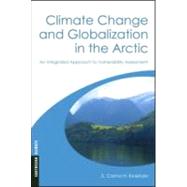Climate Change and Globalization in the Arctic
, by Keskitalo, E. Carina H.- ISBN: 9781844075287 | 1844075281
- Cover: Hardcover
- Copyright: 5/30/2008
Climate change vulnerability assessment'to assess people's overall vulnerability and adaptive capacity to climate change'is a rapidly developing field. However, despite the fact that major trends such as globalization and the changing characteristics of the political and economic governance systems are crucial in impacting and shaping a community's capacity to adapt to climate change, these trends are seldom included in climate change vulnerability assessments. An applied methodology and framework for qualitative assessment of vulnerability based in the present and on people's own perceptions of their realities has so far largely been lacking. This book addresses these shortcomings in that it first develops a methodology and framework for qualitative vulnerability assessment in "multiple impact" studies (of climate change and globalization), and then applies the framework to several cases of renewable natural resource use across scales. The book draws upon case studies of forestry and fishing'two of the largest sectors that rely on renewable natural resources'and reindeer herding in the European North, and includes data from some sixty semi-structured interviews and seven stakeholder meetings. The study represents a bottom-up view, originating with the stakeholders themselves, of the degree to which stakeholders find adaptation to climate change possible, how they conceive of climate change, and how they evaluate it in relation to their other concerns, notably economic and political ones. It illustrates that local vulnerability and adaptive capacity are to a large degree a result of international and national governance, that much of the adaptive capacity for local areas lies at higher, even international, levels (which the local level has limited or no influence on) and that not even a "traditional" practice such as indigenous reindeer herding can be understood outside of international market systems. Moreover, the approach and research results include features that could be broadly generalized to other geographic areas or sectors characterized by renewable natural resource use. The book constitutes highly informative reading for professionals, academics and students concerned with the human dimensions of global environmental change, environmental governance and natural resource management.







